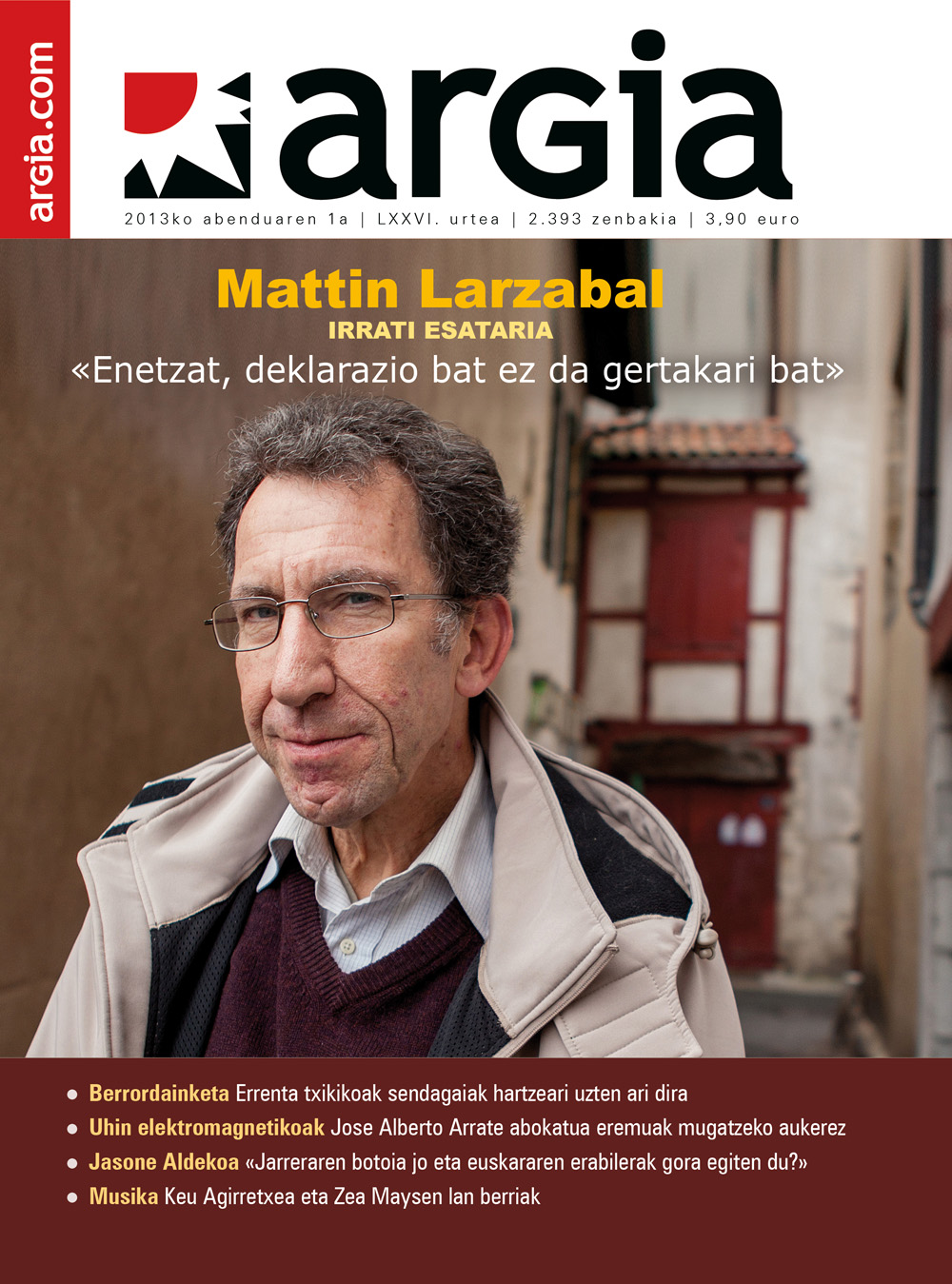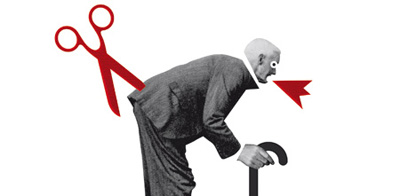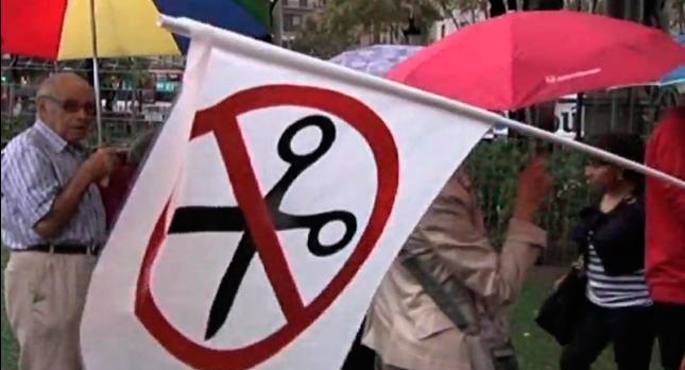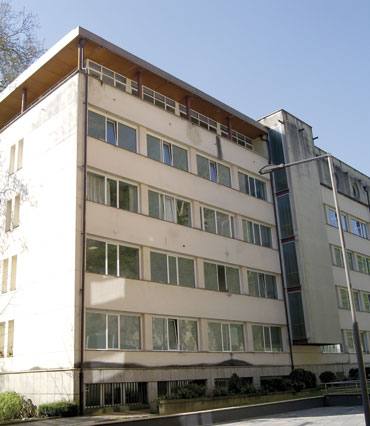The art of punishing the most disadvantaged pensioners
- “So much turbulence because you have to pay six euros a month?” What does it mean to pay EUR 8 per month for a pension of some EUR 600? In Navarre, about 40% of pensioners are entitled to receive less than EUR 650 on average. In the Basque Autonomous Community, 73% have a pension below EUR 1,000.
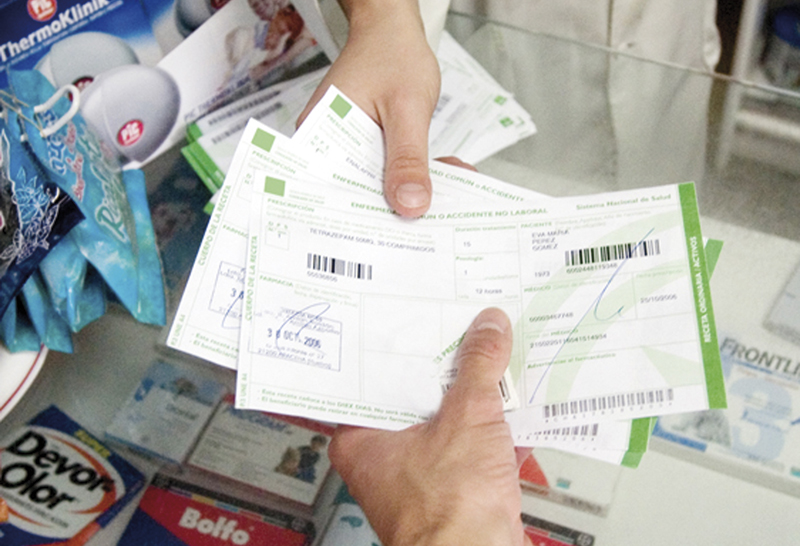
The Government of Navarra has in force since 1 July 2012 the repayment of medicines. The Basque Government, through an appeal, has not established the measure until 1 July 2013. Both administrations have given a different response to the Spanish Government’s decree: The Government of Navarra has argued that there is no choice but to comply with the order and has assumed that citizens pay 10% for the purchase of medicines in establishments. The Basque Government, for its part, approved last week a decree distributing EUR 18 million of aid to the citizens most affected by the repayment. The decision of the Basque Government will affect 400,000 citizens: pensioners who receive less than EUR 18,000 a year, unemployed without economic benefits and immigrants who are not in the health system. Payments made as from 1 July 2010 will also be available to those affected. The objective of the Basque Government is to ensure equality in health and to provide social support to the people who need it most.
In the following lines, several people have valued the decree of the Spanish State and have taken into account that they do not know the measure taken by the Basque Government.
Above all, those with the worst pensions are suffering the effects of the repayment. Because, let us say, the pensioners' group is not distinguished precisely by its excellent monthly salary. In the case of pensioners who stop receiving medicines prescribed by the doctor. The person receiving 400 euros decides whether to eat, to switch on heating in winter or to buy medicines. Suppose the 80-year-old grandmother is doing three treatments and taking ten drugs a day. You are told in the pharmacy that they are worth EUR 15. Grandma will have to pay everything and within three months the Government of Navarra will refund the difference of up to EUR 8. In other words, those who have to arrive at the end of the month have to advance the money. Pharmacy workers have become accustomed to hearing questions such as: “Which medicine is more important, this one I am taking or this other?” “Will I leave cholesterol or tension medicines?”
The medicine is not a consumer product
Ángel Garay is the president of the Pharmaceutical Association of Gipuzkoa. The reform of the IT system of the pharmaceutical network has required a major task of repairing. In fact, the Basque Government did not want money to be returned to the citizen in the months following the recovery of more than the monthly average. Once the IT network is adapted, customers do not pay more than they can. Therefore, if the Navarre grandmother we talked about earlier lived in Gipuzkoa, she would pay 8 instead of 15 euros per month. The Pharmaceutical Association does not agree with the repayment that has been imposed from Spain and, as they are obliged, will take the best possible measures.
In the opinion of Garay, the role of the drug should be highlighted: “The medicine is not a consumer product and acting as such is a mistake. It is true that the medicine is an investment and the administration must calculate the efficiency for every euro. Medicines should not be used in excess or in excess, and it occurs on both sides. On the one hand there is the economic aspect and on the other there is the health of society and of each of the inhabitants. At the CAPV, we measure customer consumption in millimeters. Having this data is good, but do we know if that investment has served to improve the health of society and of each of the inhabitants?” The figure for the three months is that, when citizens paid 5% of the medicine, in three months around 750,000 euros were raised, 10% with 1,712,170 euros.
Those who need it most are hidden
José Mari Agirresarobe is a member of the Gipuzkoan association Dignasuna, an association he currently works in. Pensioners meet and participate in various initiatives. The nearly 28,000 signatures collected in two months are proof that they do not agree with the repayment. In Bizkaia and Álava, signatures have also been collected. Unlike the Dignasuna association, the focus was on the Basque and Alavese capitals. They were far from the number of signatures in Gipuzkoa. According to Agirresarobe, the further away from the CAV the movement against the repayment is weaker, “the higher wages of pensioners are in the CAV and the stronger movement too”. Those who do not have urgent needs struggle to pay less for medicines. Where is the one who does not come to the end of the month? “Those who least need it are working. We want to face those who are wrong, but they do not come to us. Hiding is so great that even in the association we know that there are people who need help and do not accept it, ‘I don’t want money’. It is a matter of social justice, but embarrassed, full of complexes, as if they were given a handout. That culture has people crushed, it doesn't want to appear. Immigrants do not live like this and take more advantage of the rights that we also have.”
Sebastian Rosino is a member of the Sasoia association. For seven years they have been working in the counties of Pamplona, Sakana and Burlada. Most members of the association are in a position to make ends meet, “the lowest pensions are not seen.” According to Rosino, there are three reasons to understand the position of the most inward-looking. First, there are people who are still living in fear, and proof of this is what happened on the street to a member association. He was distributing propaganda against the repayment, and a woman came up to him. “I don’t want them to see me, if they don’t take my pension away.” He patrolled less than 400 euros a month, “Franco’s heritage is alive.” Secondly, one tends to plead guilty. To tell him that he doesn't come gives him embarrassment, he believes that despite having worked a lot his whole life, for something they don't come to the end of the month, because neighbors arrive. Thirdly, psychological problems have multiplied due to extremely serious situations. In addition, in cases where the family must also be maintained, they are exhausted and overwhelmed.
Agirresarobe wants to highlight the situation of women who do not have a face and not necessarily of widows. Those who receive more than EUR 1,000 are a minority. Despite having worked a lot, they have barely paid, so pensions are very low. Widows, depending on the pension of their deceased husband, may have a somewhat better pension, even if they are halved. For example, if the husband had a pension of EUR 1,600, the widower will have to pay EUR 800 per month.
Another thing is that in recent years many pensions have to be divided into two, three and four. Agirresarobe knows such a family: her husband has a pension of 1,200 euros, her wife works without pay in the family business and her two children have been unemployed for years. “If you make a division each lives with 300 euros. This is how they live.”
The Dignity Association claims that all pensioners raise at least EUR 1,000, “the CAV average, EUR 1,200, is misleading, because of the 630,000 pensioners, 500,000 receive less than 1,000. We do not believe that within today’s economy a person can have a dignified life below 1,000 euros.”
The aim is not to reduce, but to privatize
The crisis is the excuse for the Spanish Government to also apply cuts in health services. They say that we have to save. According to Rosino, this is not a fundamental objective, but to privatize health services and gain more from the pharmaceutical industries. “We are told that we are in crisis and that society has spent a lot of money, and that is why we have to pay more for medicines, and that ambulances and prosthetics are also going to be on our own. They want health services to be managed by private hands and are able to mislead those who work well in the public system.” Rosino, a Navarro, referred to the catering service provided at the Hospital de Pamplona. Since the management of food has been left in private hands, protests have been non-stop for poor service. Rosino believes that it has not been privatized to save money and be more efficient, but that the public has left the public hospital (how bad it is to eat!) And to flee privately. “It’s absurd to think that the private goes cheaper than the public. The public doesn't need to make money, the private does. It’s impossible for the private to be cheaper if you want to maintain quality.”
Isn't it better to cure a cold than a bronchitis?
We have been told that the repayment has been made in order to save money, but all those who have so far spoken in this report think that savings are very doubtful. When it is essential not to take medication has consequences. The example of the chronically ill demonstrates this. Sometimes they stop taking medications for a thousand reasons or take them unduly, and those dismissals have direct consequences on their health. Let us put aside the chronically ill and take a retired man who has taken the unwise cold. The doctor has decided not to use the prescribed prescription, as he prefers to turn on the stove during the cold period. Diarrhea can become bronchitis and you don't need anything to go to the emergency room. Curing bronchitis is more expensive than removing the cold, and the emergency physician is more expensive than the family doctor. This is the example that Itziar Irazabal has used to explain the nullity of the repago. Irazabal has spoken to us on behalf of the Forum for the right to health of all people, but it is noted that he is a member of Doctors of the World. He considers that the repayment is not a violation of a fundamental right such as saving, but an example of a repayment in the violation of the right to health. For example, by means of the health card, some citizens who do not meet the access requirements have been left out of the public service. Think of immigrants, “there is a game between rich and poor, if you have to pay for good health services and if not, you won’t. Even if you die the same, you're poor." The repayment has had its strength, especially in the protests of the pensioners, “we all go to the pharmacy, anyone can be adapted, and that is why it is famous. On the contrary, those who enter the health system and those who do not have such extension”.
What Irazabal fears the most is not the repayment, but the trace that the Government of Spain is taking in health, education... if you have it you will live well and you do not have it. In his view, the health service of the Spanish State, which is coming down, has been an example for years. The Basque Government, for its part, has also considered that Osakidetza is a symbol of the Basque Health Service and is making efforts to maintain it.
Botiken berrordainketa sistema martxan da astelehenetik aurrera Araban, Bizkaian eta Gipuzkoan. Herritarrek euren soldataren araberako gainprezioa ordaindu beharko dute botikengatik. Prestaziorik gabeko langabeek eta pentsio minimoa duten erretiratuek ez dute ordaindu beharrik... [+]
Botiken berrordainketa indarrean ezarriko da EAEn uztailetik aurrera. Bertako biztanleek euren soldataren arabera ordaindu beharko dute botiken gainprezioa, prestaziorik gabeko langabeek eta pentsio minimoa duten erretiratuek izan ezik.
Nafarroako osasun sistema publikoak dituen arazoak salatzeko protestaldiak antolatu ditu Nafarroako Osasun Plataformak herrialde osoan. Maiatzean eta ekainean zehar, asteazkenero elkarretaratzeak egingo dituzte osasun etxeen aurrean.
Eusko Jaurlaritzako bozeramaile Josu Erkorekak adierazi du botiken berrordainketa aplikatzea beste aukerarik ez duela ematen legeak. Data zehatzik eman ez duen arren, Erkorekak esan du urtea amaitu aurretik martxan jartzea espero dutela.
Eusko Jaurlaritzak dekretua onartu zuen joan den ekainean, Espainiako Gobernuak Osasun arloan hartutako hainbat neurriri kontra eginez. Hala, herritarrek botikak berriz ordaintzeko aginduari eta paperik ez duten etorkinak artatzeko debekuari uko egin zion Jaurlaritzak... [+]
Osakidetza’s reputation came beforehand and in the last legislature has taken strong measures to maintain it, largely avoiding the pressure of Madrid: maintaining funding, reducing expenditure on generic drugs, preventing a recurrence.
– The winner is the PNV. He is in... [+]
Hego Euskal Herriko biztanleek pentsioetan murrizketa handiak jasateko arriskua dute Espainiako Estatuko ekonomiaren kolokak eraginda. Ignacio Escolar kazetariak bere blogean dioenez, laster iragar dezake Rajoyren gobernuak neurri garrantzitsuren bat. Bere analisia euskaratu... [+]
Eusko Jaurlaritzak berehala jarri beharko du indarrean botiken berrordainketa Araban, Bizkaian eta Gipuzkoan, Espainiako Konstituzio Auzitegiak tramitera onartu baitu Espainiako Gobernuak Jaurlaritzaren dekretuaren aurka jarritako helegitea. Jaurlaritzaren dekretua legez... [+]
Eusko Jaurlaritzatik esana bazuten ere EAEn ez direla ezarriko Espainiako Gobernuak Hezkuntza eta Osasun arloetan egin dituen murrizketak, Rajoyren Gobernuak neurriak hartuko ditu horri buelta emateko. Eusko Jaurlaritzaren erabakia legez kontrakoa dela argudiatuz helegitea... [+]
Botiken berrordainketa igande honetan jarriko da martxan Nafarroan, Espainiako Estatuko ia erkidego guztietan bezala. EAEn ordea ez da berrordainketarik aplikatuko. Prestaziorik gabe geratzen diren langabetuek eta pentsio ez-kontributiboa (asistentziala) jasotzen duten... [+]
Botiken berrordainketa Hego Euskal Herrian ezartzeko urratsak ematen ari da Espainiako Gizarte Segurantza eta aste honetan Araba, Bizkaia eta Gipuzkoako Foru Aldundiei euren ogasuneko datu-baseak eskatu dizkie.
The Spanish government of pp has taken a new step in the fight against the working class and the grass-roots sectors. A few weeks ago, it imposed a labour reform that included cheaper dismissal and greater insecurity. In education, there have also been cuts that you're going to... [+]
Pentsiodunek errezetatzen zaizkien botiken %10 eta herritar aktiboek %50 ordaindu beharko dute aurrerantzean, Ana Mato Espainiako Osasun ministroak atzo jakinarazi zuen moduan. Gaur egun pentsiodunek ez dute deus ordaintzen, eta gainerako herritarrek %40 ordaintzen dute.









